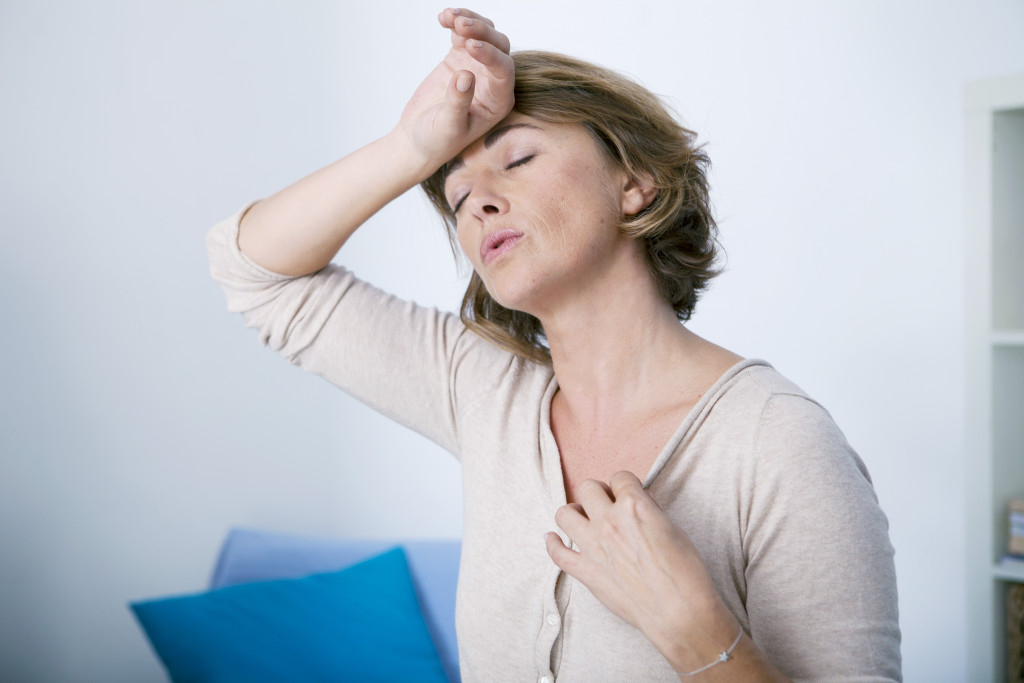At some point in a woman’s life, she will undergo menopause. This is a natural, biological process when the ovaries stop producing eggs and hormone levels decrease. Menopause usually occurs in women aged 45-55, but it can happen earlier or later.
Knowing about how your body will change or is changing will help you better cope with menopause and the symptoms that come along with it. So, here’s what you can expect during this time of great change.
The Common Menopausal Symptoms
There are various symptoms associated with menopause. Some women will only experience a few, while others may experience many. The gravity of the symptoms will also vary from woman to woman. The most common symptoms include:
-
Hot flashes
These are sudden feelings of warmth, often followed by sweats.
-
Night sweats
Like hot flashes, night sweats are episodes of sweating at night.
-
Irregular periods
Your period may become lighter, heavier, or more erratic. You may also skip periods altogether.
-
Vaginal dryness
This is due to the decrease in estrogen levels, which can cause the vaginal tissue to thin and become less elastic.
-
Mood swings
You may feel more irritable, anxious, or depressed.
-
Sleep problems
You may have difficulty falling asleep or staying asleep.
-
Weight gain
This is due to the decrease in metabolism and changes in hormones.
-
Joint and muscle aches
You may experience more aches and pains as you age.
-
Decreased sex drive
A lower libido is a common symptom of menopause.
-
Changes in urinary function
You may have more frequent or urgent trips to the bathroom.
-
Skin changes
You may notice your skin becomes drier and thinner. You may also see more wrinkles.
-
Hair changes
You may notice your hair becoming thinner or more brittle.
The Stages of Menopause
Despite what most people may believe, menopause doesn’t just happen once — it’s divided into three stages. Here’s a closer look at how each stage is defined:
Perimenopause
This is the stage before menopause wherein the hormone levels fluctuate and decline. Many OB-GYNs recommend taking vaginal probiotic capsules to help with perimenopause symptoms like vaginal dryness or itchiness. Perimenopause can happen a few years before menopause, and for some women, the symptoms can be quite severe.
Menopause
Menopause is when a woman hasn’t had a period for 12 months straight. This is the final stage of menopause, and it can be difficult for many women because the symptoms are usually the most severe. For instance, you may find it harder to sleep, you may gain weight, and your mood swings may be more extreme.
Postmenopause
This is the stage after menopause. During postmenopause, hormone levels remain low and stable, which means the menopausal symptoms should start to improve. However, some women may still experience hot flashes and other symptoms.
The Impact of Menopause on a Woman’s Body and Mind
Menopause can significantly impact a woman’s body and mind because of the changes in hormone levels. These changes can affect everything from your sleep to your mood to your sex drive. That’s why it’s essential to be aware of the potential changes and to find ways to cope with them, such as:
Tip #1 Getting enough sleep
This can be difficult during menopause because of hot flashes, night sweats, and other symptoms. But it’s essential to get enough sleep to help your body cope with the changes. You can create a cool, comfortable environment in your bedroom by practicing a bedtime ritual that relaxes you, such as reading or taking a bath.
Tip #2 Eating a healthy diet
During menopause, it’s crucial to eat a healthy diet to help your body cope with the changes. This means eating plenty of fruits, vegetables, whole grains, and lean protein. You should also limit your intake of processed foods, sugary drinks, and alcohol.
Tip #3 Exercising regularly
Exercise can alleviate some symptoms such as weight gain, mood swings, and sleep problems. It’s also a great way to boost your energy levels and cope with stress. So, dance around your living room, take a brisk walk around the neighborhood, or do some HIIT exercises if you’re feeling up to it.
Tip #4 Managing stress
Stress can aggravate menopausal symptoms, so it’s crucial to find ways to manage it. This can include exercise, relaxation techniques like yoga or meditation, and talking to your friends or family about what you’re going through.
Tip #5 Seeing your doctor
If you’re struggling with the symptoms, you must see your doctor regularly. They can help you manage your symptoms and may even prescribe medication if necessary, which can help with things like hot flashes and vaginal dryness.
Menopause is a natural process that all women go through, but it can be a difficult time for many. By being aware of the changes your body may go through and the ways to cope with them, you can make menopause a little easier to deal with.

